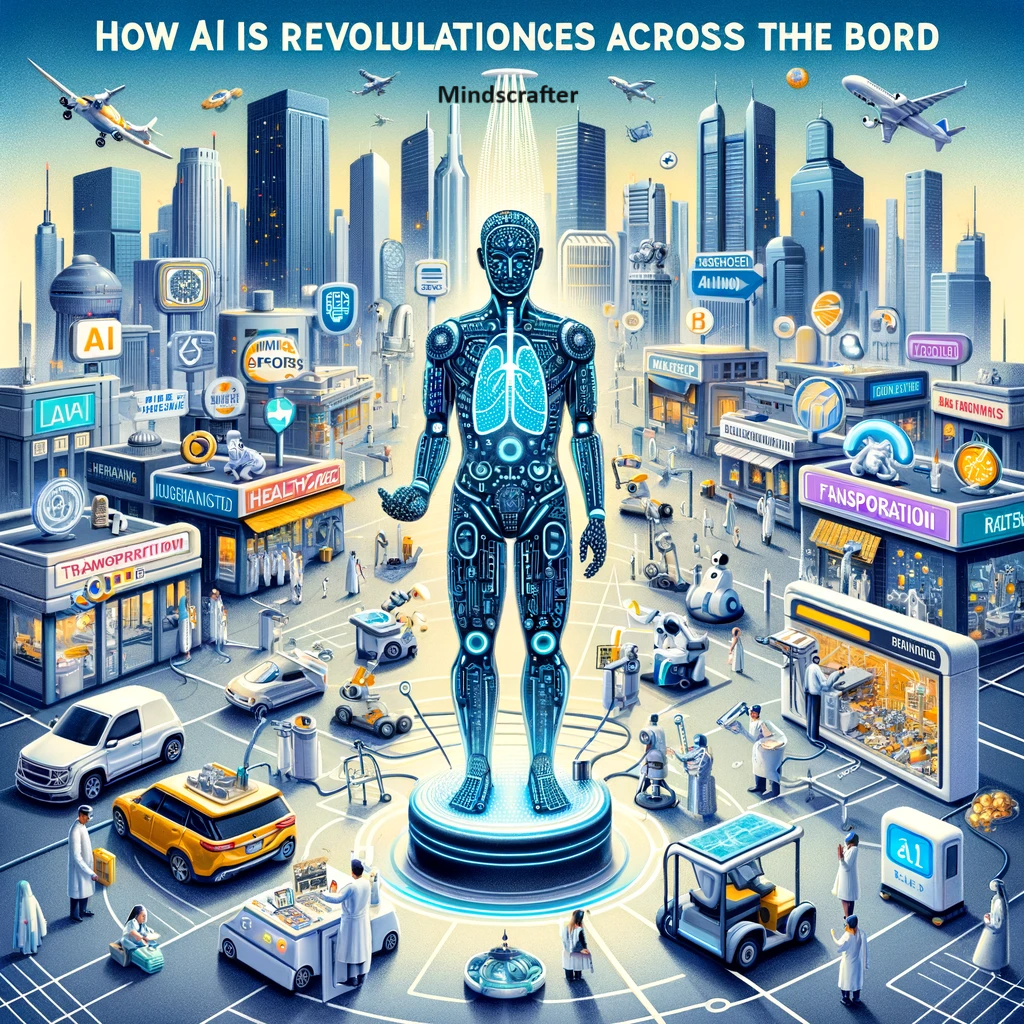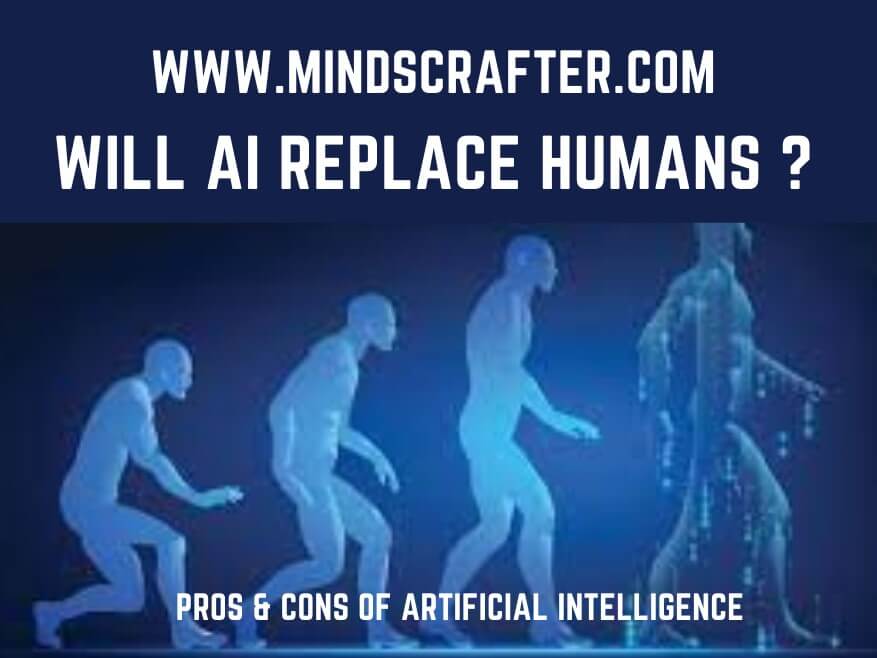
How AI is Revolutionizing Industries Across the Board:
The future has arrived, and it’s being driven by artificial intelligence (AI). Applications of Artificial Intelligence is revolutionizing industries across the board from healthcare to finance, transportation to retail. The ability to automate tasks, analyze data, and make predictions with unprecedented accuracy has made AI a game-changer in the business world. With the rise of machine learning and other AI technologies, companies can streamline processes, improve customer experiences, and gain insights that were once impossible to obtain. But AI isn’t just revolutionizing how businesses operate—it’s also changing how we live our lives. AI is becoming an increasingly pervasive part of our daily routines, from voice assistants to self-driving cars. This article will explore the ways in which AI is transforming industries and what the future may hold for this game-changing technology.
Benefits of AI for Businesses:
Artificial Intelligence (AI) is bringing a revolution in the business world, and it is not hard to see why. The ability to automate tasks, analyze vast amounts of data, and make predictions with unprecedented accuracy makes AI a game-changer for businesses. With the rise of machine learning and other AI technologies, companies can streamline processes, improve customer experiences, and gain insights that were once impossible to obtain.
One of the most significant benefits of AI for businesses is the ability to automate repetitive tasks. This can free up time for employees to focus on more complex and creative tasks, increasing productivity and efficiency. AI can also analyze vast amounts of data in real time, providing insights that can be used to improve decision-making and drive business growth.
Another advantage of AI for businesses is the ability to provide personalized customer experiences. With AI-powered chatbots and voice assistants, companies can engage with customers 24/7, providing instant responses to queries and delivering personalized recommendations based on individual preferences. Overall, the benefits of AI for businesses are numerous and diverse, and it is clear that this technology is here to stay.
AI statistics and trends:
The growth of AI has been nothing short of phenomenal in recent years. From 2015 to 2020, the global AI market grew at a CAGR of 28.5%, and it is projected to reach $312.4 billion by 2027. The use of AI is also becoming more widespread, with industries such as healthcare, finance, and retail leading the way. Massive usage of AI in healthcare for medical research, diagnosis, and treatment planning. In finance, financial sectors are using AI for fraud detection, risk management, and investment decision-making. And in retail, industries are using AI for personalized marketing, inventory management, and supply chain optimization.
Another trend in AI is the rise of machine learning, a subset of AI that involves training machines to learn from data. This technology is using various applications, from image recognition to natural language processing. Overall, the statistics and trends in the AI space point to a bright future for this technology, with continued growth and innovation on the horizon.
AI and automation in manufacturing:
AI is transforming the manufacturing industry in a big way. With the ability to automate tasks, analyze data, and make predictions with unprecedented accuracy, AI is helping manufacturers to streamline processes, improve quality control, and reduce costs.
One of the most significant areas of impact for AI in manufacturing is automation. AI-powered robots and machines can perform repetitive tasks quickly and precisely, freeing employees to focus on more complex and creative tasks. This can lead to increased productivity and efficiency and improved safety in hazardous environments. Quality control managers now use AI to improve quality control in manufacturing, AI can detect defects and other issues in real time, allowing manufacturers to address problems and prevent costly mistakes quickly.
AI in healthcare and medical research:
AI is revolutionizing healthcare by allowing medical professionals to analyze vast amounts of data and make predictions with unprecedented accuracy. This technology is being used in various applications, from diagnosis and treatment planning to drug discovery and medical research.
Medical imaging is one of the most significant areas of impact for AI in healthcare. AI-powered algorithms can analyze medical images such as X-rays, CT scans, and MRIs, detecting abnormalities and providing accurate diagnoses. This can lead to earlier detection of diseases and better treatment outcomes. Researchers are using AI in drug discovery and medical research, AI can identify potential drug candidates and predict their efficacy. This can help to speed up the drug discovery process and reduce costs.
AI in finance and banking:
AI is transforming the finance and banking industry by providing powerful tools for fraud detection, risk management, and investment decision-making. With the ability to analyze vast amounts of data in real time, AI is helping financial institutions to make more informed decisions and reduce risks.
Fraud detection is one of the most significant impact areas for AI in finance. AI-powered algorithms can detect fraudulent activity in real-time, allowing financial institutions to respond quickly and prevent losses. AI is also being used for risk management, predicting potential risks and identifying areas of vulnerability. Many small to medium based investors use AI for investment decision-making. AI can identify trends and predict market movements, helping investors to make more informed decisions.
AI in customer service and support:
AI is revolutionizing customer service and support by offering instant responses to queries and personalized recommendations based on individual preferences. This technology is being used in various applications, from chatbots and voice assistants to recommendation engines and personalized marketing.
One of the most significant areas of impact for AI in customer service is chatbots and voice assistants. AI-powered chatbots can provide customers with instant responses to queries, freeing employees to focus on more complex tasks. Voice assistants such as Amazon’s Alexa and Google Home can provide personalized recommendations based on individual preferences, helping to improve the customer experience. Entrepreneurs are also using AI for personalized marketing. By analyzing customer data, AI can provide personalized recommendations for products and services, improving customer engagement and loyalty.
AI in marketing and advertising:
AI is transforming marketing and advertising by providing powerful tools for personalized targeting, predictive analytics, and content optimization. This technology is being used in various applications, from personalized marketing and retargeting to content creation and optimization.
One of the most significant areas of impact for AI in marketing is personalized targeting. AI-powered algorithms can analyze vast amounts of data to identify individual preferences and behaviors, allowing marketers to deliver personalized messages and offers. AI is also being used for predictive analytics, predicting which customers are most likely to convert and optimizing marketing campaigns accordingly. People use AI for content creation and optimization. AI-powered tools can analyze data to identify the most effective content formats and topics, helping marketers to create content that resonates with their audience.
Ethical Concerns and Challenges of AI:
While the benefits of AI are numerous and diverse, ethical concerns and challenges are associated with this technology. One of the biggest concerns is the potential for AI to be used for malicious purposes, such as cyber-attacks and autonomous weapons.
Another concern is the potential for AI to perpetuate bias and discrimination. AI algorithms are only as good as the data they are trained on, and if this data is biased, the resulting algorithms will also be biased. This can lead to discrimination in hiring, lending, and criminal justice areas. There is also a concern about the impact of AI on jobs. While AI can automate repetitive tasks, this can also lead to job displacement and a shift in the types of skills that are in demand. Overall, there are many ethical concerns and challenges associated with AI, and it is essential for society to address these issues as this technology continues to evolve.
Future of AI:
The future of AI is bright, with continued growth and innovation on the horizon. One of the biggest trends in the AI space is the rise of edge computing, which involves processing data at the edge of the network rather than in the cloud. This can lead to faster processing times and reduced latency, making AI-powered devices more responsive and efficient.
Another trend in AI is the rise of explainable AI, which involves making AI algorithms more transparent and interpretable. This can help address concerns about bias and discrimination and increase trust in AI-powered systems.
Conclusion:
In conclusion, AI is revolutionizing industries across the board, from healthcare and finance to manufacturing and retail. The ability to automate tasks, analyze data, and make predictions with unprecedented accuracy has made AI a game-changer in the business world. With the rise of machine learning and other AI technologies, companies can streamline processes, improve customer experiences, and gain insights that were once impossible to obtain. However, there are also ethical concerns and challenges associated with this technology, and it is crucial for society to address these issues as AI continues to evolve. Overall, the future of AI is bright, with continued growth and innovation on the horizon.

